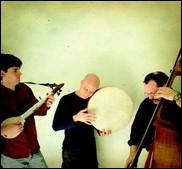Get your groove on with Free Planet Radio

Free Planet Radio uses instruments from other cultures to create its groovy sound. The band members are (from left to right) Chris Rosser, River Guerguerian and Eliot Wadopian.:Karen Balmes
February 20, 2007
Dotars and congas and bass – oh my! Students will be in awe when Free Planet Radio, an instrumental world/jazz trio from Asheville, N.C., performs at noon today in the University Union Redwood Room. The trio is one of many jazz and classical music ensembles set to perform for the music department’s Festival of New American Music.
Unlike other world music groups, Free Planet Radio draws from multiple cultures rather than focusing on one cultural style. “Our goal was to explore the common relationships between music of different cultures,” said Chris Rosser, the trio’s multi-instrumentalist and composer.
“We’re trying to develop it into something new and focus on the common elements on how they work together rather than keeping them all separate,” Rosser said of different world music genres. The trio’s name can be defined as “Music of the world without borders.”
Free Planet Radio has managed to blend Middle Eastern, Indian and Afro-Cuban musical styles into one unique sound – while approaching world music through a jazz and classical methodology.
“College students generally have an open mind,” said River P. Guerguerian, the trio’s multi-percussionist. “I think they’ll really dig it ’cause it’s not too hard on the ears.” Free Planet Radio’s music is meditative enough to put listeners into a trance, but still has enough groove and eccentricity to grab attention. It’s the kind of music that “invites a person to come in?and stretch their ear muscles,” Guerguerian said.
But do not expect New Age music you can snooze to. “It’s not pleasant or fluffy,” Guerguerian said. “We’re trying to create music that has some integrity (and) engages the mind, too.”
This is evident in the trio’s musical expertise, demonstrated by its unique fusion of styles as well as its often intimidating and complex time signatures, with some songs in 7/4 time and 18/8 time.
Free Planet Radio also employs the use of many instruments from other cultures, including the Indian dotar, a two-stringed lute and the cumbus oud, a Turkish stringed instrument. Both are played by Rosser, whose background in Middle Eastern and Indian music is vast. “I grew up in a Bahá” family so I was around a lot of Irani music growing up,” Rosser said. In 1999 he received a grant to study Hindustani classical music and the sarod, an Indian lute, under the guidance of renowned Indian musician Ali Akbar Khan.
Already a professional solo-performer and composer, Rosser met Guerguerian and Grammy-award winning bassist Eliot Wadopian through collaboration. They both backed Rosser’s vocal tracks. “Eventually we started doing a lot more improvising and mixed in a lot more instrumental songs,” Rosser said. “It developed into something.” Free Planet Radio has been playing together since 2001.
As a group, it has released one full-length album in 2004: “New Bedouin Dance.” The album is rich in Middle-Eastern and Indian influences, with tracks of sonic exploration ranging from four to seven minutes long. Rosser said that they are currently working on a new full-length album which should be released in about a year and a half.
Free Planet Radio might be thought of as a super group of sorts, since all three members have an impressive professional repertoire as solo artists or collaborative performers.
Rosser has released four albums as a solo-performer and has played with notable folk and pop artists like Nickel Creek and John Mayer.
Guerguerian has recorded on more than 50 albums and soundtracks. He has performed with such artists as Omar Faruk Tekbilek and Chuck Berry, as well as with the BBC Concert Orchestra. For five years, Guerguerian resided at the Binsar Wildlife Sanctuary in the Himalayas. “I was really outside of civilization,” Guerguerian said. “It made my devotion to sound even deeper.” Aside from performing, he currently conducts rhythm and sound exploration workshops in which students learn about the essence of sound.
Wadopian’s musical career spans more than 20 years. He has performed with countless musicians including Jon Faddis, David Wilcox and Yo Yo Ma. In addition to regular performances with mid-Atlantic symphony orchestras, Wadopian also teaches at Western Carolina University and Mars Hill College in North Carolina.
While all three are busy with other musical projects, Rosser said that they perform together at least ten to fifteen times a year. “This group is my favorite. It’s the one I put most of my energy into,” Guerguerian said. “For all three of us, it’s our main group. If we had a choice we would just play with this group all of the time.”
























































































































